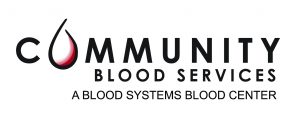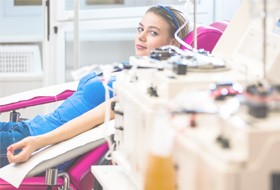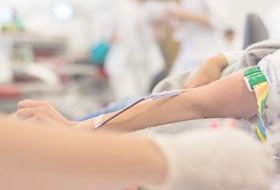Our Donors Are Special
Donor Services, which operates under the Clinical Services department at Community Blood Services, focuses on the collection of allogenic (for community), autologous (for your own surgery), directed (for a specific patient), and therapeutic (for Hereditary Hemochromatosis) blood collections. Our goal is to provide the patients we serve with the highest quality of blood products, and to assure our donors have safe and positive donation experience.
- The patient must have a written request from his/her surgeon/physician for directed donations.
- Directed units are specially tagged to ensure that you receive the blood donated specifically for you.
- Donors must at least 16 years old and weigh over 110 pounds. (Minor donors, under 18 years old, must have signed parental consent in order to donate). All donors must have identification with their name and signature on it.
- If you are a woman of childbearing age, your partner should not donate for you.
- Directed donations must be completed 5 to 7 working days before expected transfusion.
- If all the directed donations are not used in your surgery/transfusion, the blood remaining will be available to treat other patients.
- Your own blood is the safest blood for transfusion. It decreases the incidence of reactions and infections.
- A Patient Order must be submitted by your physician before your autologous donation can be scheduled.
- When scheduling your appointment, pre-screening will be performed to assure that you may safely donate. Certain medical conditions may require medical clearance to donate from your physician.
- Your hemoglobin (iron level) must be 11.0 or higher to donate blood for yourself. Your physician may prescribe an iron supplement prior to your donation.
- Autologous donations must be completed at least a week before intended transfusion. Multiple donations must be at least one week apart.
- All autologous units are specially labeled to ensure that you receive your own blood.
Hereditary Hemochromatosis is a common disorder that causes the body to absorb too much iron which could lead to other health problems. The condition may be treated with whole blood donation (or therapeutic phlebotomy), removing iron which is contained in red blood cells.
- A physician order must be submitted before scheduling a Therapeutic Phlebotomy donation.
- Other existing health conditions may require medical clearance for donation from your physician.
- The frequency of donations is determined by your physician.
All Patient/Physician Orders must be completed and submitted directly to Community Blood Services from the physician office (fax: 201-573-4626). The physician signature and date is required on every form.
All directed and autologous donations are by appointment only. Please call the Blood Center at (201) 389-0477 or (201) 444-3900, Monday through Friday, 8 a.m. to 3 p.m.
Safety and Training
We adhere to the rigorous safety rules and regulations established by the federal Food and Drug Administration (FDA), the states of New Jersey and New York, and the AABB to ensure the quality of the products we collect and the safety of both our donors and the patients who receive those products. Our highly qualified staff works hard to assist our donors with any questions they may have regarding registration, eligibility, the donation process and what to do post donation. All of our staff members have graduated from approved nursing and phlebotomy programs. In addition, Community Blood Services has been designated as a testing site for national donor phlebotomy certification, and our phlebotomists are nationally certified in both phlebotomy and donor phlebotomy. As professionals the staff attends classes and seminars to maintain their skills and increase their knowledge of new trends and technology within the field of blood collections.





